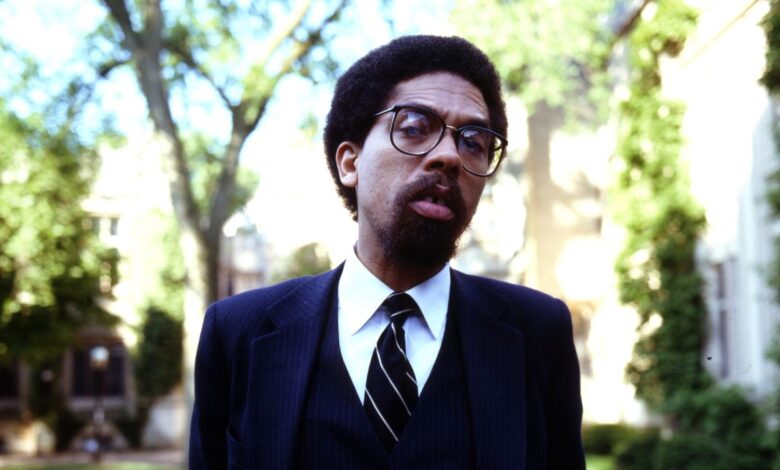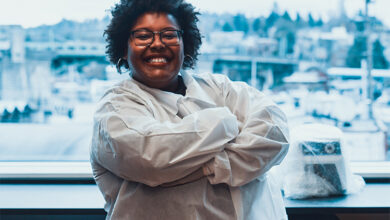Cornel West, the Public Intellectual

He felt a deep admiration for Howe and Harrington, both of whom were academic intellectuals as well as activists. “Their quality of mind came from a subculture of relentless critical engagement,” he told me. “They weren’t devoured by the academy. Their conversations were partly inside and partly outside, so that they were able to think synthetically, to form a sense of the whole. Like Edmund Wilson, they moved agilely from one issue to another, without being encumbered by specialization. Democratic socialism is their great tradition, and I do feel a bond of solidarity with it. But I also feel a bond with the feminist and womanist community, with the anti-homophobic community, with those in the black-freedom struggle who are open to the issues of class and gender. In that sense, progressive black nationalists are also comrades of mine.”
Like two of the older black intellectuals he admires—the novelist, essayist Ralph Ellison and the historian John Hope Franklin—Cornel West is a native of Oklahoma. He was born in Tulsa, on June 2, 1953, and grew up in Sacramento, where his family had settled in 1958, after a brief sojourn in Topeka, Kansas. His mother (a schoolteacher) and father (an Air Force civil servant) reared their two daughters and two sons in the church: first at Metropolitan Baptist in Tulsa and later at Shiloh Baptist in Sacramento. Metropolitan Baptist’s pastor in the fifties was West’s grandfather, the Reverend Clifton L. West, and his given name has passed down to Cornel’s father, Cornel’s older brother, and Cornel’s sixteen-year-old son (from the first of three marriages). West wrote in 1991 that “the most significant stage-setting for my own life pilgrimage” was his “closely knit family and overlapping communities of church and friends,” and that the “Christian outlook” served as “the basis for my life vocation.”
“Cornel was an energetic youngster,” his brother, Clifton, told me recently. “At home, he was a loving child, but in the streets he got into a lot of fights. He was tart-tongued. He said whatever came into his mind. It was some time before he learned to couch things in acceptable terms. Because of an asthmatic condition, which he later outgrew, he had a wiry build, but he was well coordinated, and he thought nobody could whip him. While I wouldn’t say he was a bully, he surely had his way of dispensing justice.
“And he was a leader. At Camellia Elementary School, he led a gang of male classmates, all of whom revered him. One morning, he said to them, ‘Look, you all can stand and recite the Pledge of Allegiance if you want to, don’t let me stop you. But I won’t be standing up. I’m finished with that sort of thing.’ They said, ‘Corn, if you aren’t going to salute the flag, then none of us will be standing up this morning.” And so it was. None of them stood up. A teacher recognized Corn to be the ringleader. She walked up to him and demanded to know, ‘Why do you refuse to salute the flag?’ He said to her, ‘My people have always gone abroad to fight for this country, and every one of them has come back home to second-class citizenship. The flag doesn’t represent me.’ The teacher slapped him, and Corn got up and punched her in the face. He was suspended from Camellia, and sent to the Earl Warren School, in another part of town. It was an accelerated school, and when he got there he began taking his academic studies more seriously.”
In addition to church and school, West was also captivated by the Black Panther Party, whose Sacramento office was around the corner from Shiloh Baptist Church. West was attracted to the Panthers not only for their racial militancy but also for the charitable community programs they organized on behalf of the black poor. It was during his street-corner discussions with them that he first heard of Karl Marx, a name he associated with service to the downtrodden. But he soon discovered that he couldn’t be wholly drawn to the Panthers; he couldn’t give up his religious faith for their grass-roots Marxism. Besides, he was partly repelled by their hostility toward the black church and their total contempt for the Christian ministry.
At the age of seventeen, when West graduated from John F. Kennedy High School—where he was president of the student body—he won a scholarship to Harvard. “In 1970, when I entered Harvard College, I became part of the first generation of young black people to attend prestigious lily-white institutions of higher learning in significant numbers—institutions still coping with the new wave of Jewish faculty and students who had confronted an earlier tribal civility, snobbish gentility, and institutional loyalty of primarily well-to-do white Anglo-Saxon Protestants,” West has written. “Owing to my family, church, and the black social movements of the 1960s, I arrived at Harvard unashamed of my African, Christian, and militant decolonized outlooks. More pointedly, I acknowledged and accented the empowerment of my black styles, mannerisms, and viewpoints.”
Martin Kilson was at first baffled by West’s mélange of styles and mannerisms and viewpoints. He couldn’t quite resolve what he saw as a “dissonance” between West’s “sharp, cogent, and vigorous intellect” and “a ghetto-hip street-corner persona.” Kilson thought that West was “indulging in a put-on,” he told me. “And I remember feeling that several years at Harvard would mainstream Cornel’s street-corner demeanor. Well, it turned out that he wasn’t putting on at all. The dissonance in his manner was a disciplined facet of a very bright student. He came to Harvard with an already well-shaped progressive mindset—freethinking, nondoctrinaire, and yet firm.”
West graduated in three years, magna cum laude, and, with some trepidation, went on to Princeton for postgraduate studies in philosophy. Because Princeton’s Philosophy Department, then considered the best in the nation, was known for its intellectual rigor, he feared, he later wrote, that his Christian faith would be undermined “by the powerful tools of analytical philosophy.” His fears were unwarranted. He soon discovered that none of his professors “cared about religious faith—though Walter Kaufmann and Richard Rorty regarded the issue with historic curiosity.” According to Sheldon Wolin, who was the chairman of the program in political philosophy, West “made a strong impression as a graduate student.” Princeton philosophy, Wolin told me, “is demanding to the point of neurotic preciosity, but Cornel resisted its narrowness, and the more relaxed atmosphere of the political-philosophy program allowed his natural curiosity to determine the direction of his concerns, rather than the professional stamp of a conventional discipline.”
West’s first teaching appointment—in 1977, while he was completing his doctoral dissertation—was as an assistant professor of philosophy and religion at Union Theological Seminary, in New York. He wanted to teach at Union, he later wrote, because it was “the center of liberation theology,” was “one of the best places for black theological education,” and was “the perfect place to become a broadly engaged cultural critic with a strong grounding in the history of philosophy and criticism.”
In 1984, he was lured away from Union Theological Seminary by the offer of a full professorship in religion and philosophy at the Yale Divinity School. He returned to Union in 1987, and by that time, he has written, “my faith was tested and deepened, my mind was stretched and refined, my soul was refreshed and readied for battle.” He hoped to wage that battle from a permanent base at Union Theological.
In 1988, Princeton University asked West to join its faculty as a professor of religion and the director of its program in Afro-American studies. It wasn’t the most opportune time for such an invitation, and initially West had no interest in the offer. “I had settled my heart upon Union,” he told me. “That’s where I wanted to be. Its tradition of Reinhold Niebuhr and Paul Tillich was very important to me. It still is. There’s a sense in which a seminary sits at the center of my institutional identity. I thought I was going to be at Union for the rest of my life, helping to build upon its tradition.”
But his two closest friends told him that the Princeton appointment might be too important to refuse. One was James Washington, a professor of church history at Union. The other was his brother, Clifton, in Sacramento, who works in the computer-software industry. “In a fundamental way, I’m a footnote to my brother,” Cornel says. “He’s three years older, shared his lessons with me, and taught me much of what I knew when I was young. So that my style is similar to his. He’s not a professional intellectual, but he’s a wise man. In terms of love and sensibility and compassion, we are very similar.”
And, in the end, West could not resist the entreaty of Ruth Simmons, who was then the associate dean of faculty and is now the vice-provost. “When I came to Princeton, our program in Afro-American studies was floundering,” Simmons told me some time ago. “It had been in place since 1970, but it hadn’t achieved the level of distinction expected of Princeton. Many scholars, within and outside Princeton, advised me that Cornel was my best candidate.” Still, West says, the novelist Toni Morrison, who is a professor of the humanities at Princeton, was “the major force” in his decision to go to Princeton. “She told me in one of our talks that she wanted me to become a part of her ‘intellectual neighborhood.’ ” He was won by “that lovely formulation.”
Under West’s guidance, Princeton’s program has become preëminent. “We knew when we hired Cornel that he would provide intellectual excitement, and that has turned out to be true,” Ruth Simmons said.
On a second visit to Princeton, I found West in Dickinson Hall. That building, named for the Reverend Jonathan Dickinson, the first president of the university (when it was still called the College of New Jersey), houses the Program in Afro-American Studies, and West has one of many small offices on the ground floor. Dressed in his usual fashion, he was sitting at his desk, poring over papers and smoking a cigarillo. Floor-to-ceiling bookshelves lining the walls were crammed with works in history, philosophy, religion, political theory, biography, music, architecture, fiction, poetry, literary criticism, and other subjects that filled out the range of his eclectic interests.
Source link

